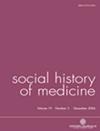爱丁堡皇家精神病院的教育性心理治疗:1845-1882 年晨曦镜的展开
IF 0.7
2区 哲学
Q1 HISTORY
引用次数: 0
摘要
摘要 本文研究了中上层阶级收费 "疯人院 "病人的道德治疗与写作的关系。他们的作品发表在 19 世纪的月刊《晨边镜报》上。该期刊与身份地位和绅士价值观的利益存在交集。尽管《镜报》的作家们被诊断出患有忧郁症等精神疾病,但他们仍能保持人性的光辉,分享对爱情和社会不公的深刻洞察。爱丁堡作为文化和科学学习中心的声誉为精神病院提供了机会,使其成为一个标志性的避难所,可以维持病人物质上优越的生活方式。晨边镜报》提供了创造性的活动、自尊的维护和公众的认可。它将精神病院与外部社会联系在一起。从心理医学的角度来看,逻辑的表达反映了理性的修复,标志着镜子的治疗效果和声誉。本文章由计算机程序翻译,如有差异,请以英文原文为准。
Educative Psychological Treatment at Edinburgh’s Royal Asylum: Unfolding The Morningside Mirror, 1845–1882
Summary This article examines moral therapy in relation to writing by fee-paying ‘lunatic’ asylum patients from the upper and middle classes. Their work was published in a nineteenth-century monthly periodical, The Morningside Mirror. There is an intersection of the periodical with status and the interests of gentlemanly values. Despite their psychopathological diagnoses, which included melancholia, writers for the Mirror retained their human capacity to share poignant insights into love and social injustice. Edinburgh’s reputation as a cultural and scientific centre of learning provided opportunities for the asylum to market itself as an iconic sanctuary that could maintain the materially privileged lifestyles of patients. The Morningside Mirror offered creative activity, self-esteem maintenance and public recognition. It connected the Asylum to the society outside. The expression of logic as reflective of the repair of reason signalled, from the viewpoint of psychological medicine, the Mirror’s therapeutic impact and utility to project reputation.
求助全文
通过发布文献求助,成功后即可免费获取论文全文。
去求助
来源期刊

Social History of Medicine
社会科学-科学史与科学哲学
CiteScore
1.60
自引率
0.00%
发文量
63
审稿时长
>12 weeks
期刊介绍:
Social History of Medicine , the journal of the Society for the Social History of Medicine, is concerned with all aspects of health, illness, and medical treatment in the past. It is committed to publishing work on the social history of medicine from a variety of disciplines. The journal offers its readers substantive and lively articles on a variety of themes, critical assessments of archives and sources, conference reports, up-to-date information on research in progress, a discussion point on topics of current controversy and concern, review articles, and wide-ranging book reviews.
 求助内容:
求助内容: 应助结果提醒方式:
应助结果提醒方式:


